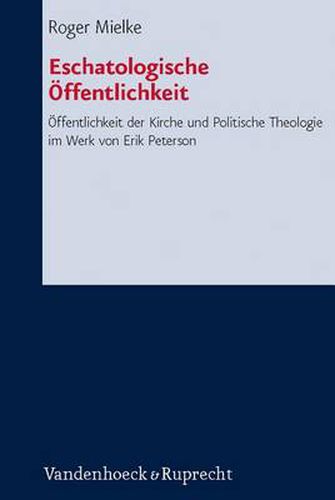Readings Newsletter
Become a Readings Member to make your shopping experience even easier.
Sign in or sign up for free!
You’re not far away from qualifying for FREE standard shipping within Australia
You’ve qualified for FREE standard shipping within Australia
The cart is loading…






Contemporarily Theology and Political Sciences are on the way of reinventing Erik Peterson (1890-1960) as a central figure in the discourses of 1920s to 1950s. The volumes of his Ausgewahlte Schriften give us insight into a thinking of high inner tensions, which was developed in an intellectual exchange with many important dialogue partners. First of all, Peterson’s concept of the Political is of a high interest. Peterson formed this concept in a constant discussion with the famous and notorious jurist Carl Schmitt. In the early 30s their friendship an intellectual partnership broke because of their different statements to the totalized Political and the national socialist ideology. Peterson confronted the political Totalitarianism with an apocalyptical concept and image of the church as an independent public sphere, which has its main publicity through the worship in front of God’s throne in the community of the earthly church and the heavenly assembly of angels. From this specific concept of publicity Peterson got an eminently critical power of judgement against political totalitarianism, which he viewed as the consequent self fulfilment of modernity. On his way Peterson converted from Lutheran Protestantism to Roman Catholicism in 1930. Until today his strongly liturgical and dogmatical shaped theology is a challenge for the search for a forthcoming ecumenical church.This volume is the first monograph about Peterson from a protestant perspective. Roger Mielke focuses on the concepts of the public and the political in Peterson’s work - especially in relationship to Schmitt’s project of a Political Theology and the intellectual exchange between Peterson and Schmitt. The author views the different contemporary discourses where the motives of Peterson’s work are influential and has a special interest in the Radical Orthodoxy -discourse which is not yet received broadly in German speaking theology.
$9.00 standard shipping within Australia
FREE standard shipping within Australia for orders over $100.00
Express & International shipping calculated at checkout
Contemporarily Theology and Political Sciences are on the way of reinventing Erik Peterson (1890-1960) as a central figure in the discourses of 1920s to 1950s. The volumes of his Ausgewahlte Schriften give us insight into a thinking of high inner tensions, which was developed in an intellectual exchange with many important dialogue partners. First of all, Peterson’s concept of the Political is of a high interest. Peterson formed this concept in a constant discussion with the famous and notorious jurist Carl Schmitt. In the early 30s their friendship an intellectual partnership broke because of their different statements to the totalized Political and the national socialist ideology. Peterson confronted the political Totalitarianism with an apocalyptical concept and image of the church as an independent public sphere, which has its main publicity through the worship in front of God’s throne in the community of the earthly church and the heavenly assembly of angels. From this specific concept of publicity Peterson got an eminently critical power of judgement against political totalitarianism, which he viewed as the consequent self fulfilment of modernity. On his way Peterson converted from Lutheran Protestantism to Roman Catholicism in 1930. Until today his strongly liturgical and dogmatical shaped theology is a challenge for the search for a forthcoming ecumenical church.This volume is the first monograph about Peterson from a protestant perspective. Roger Mielke focuses on the concepts of the public and the political in Peterson’s work - especially in relationship to Schmitt’s project of a Political Theology and the intellectual exchange between Peterson and Schmitt. The author views the different contemporary discourses where the motives of Peterson’s work are influential and has a special interest in the Radical Orthodoxy -discourse which is not yet received broadly in German speaking theology.